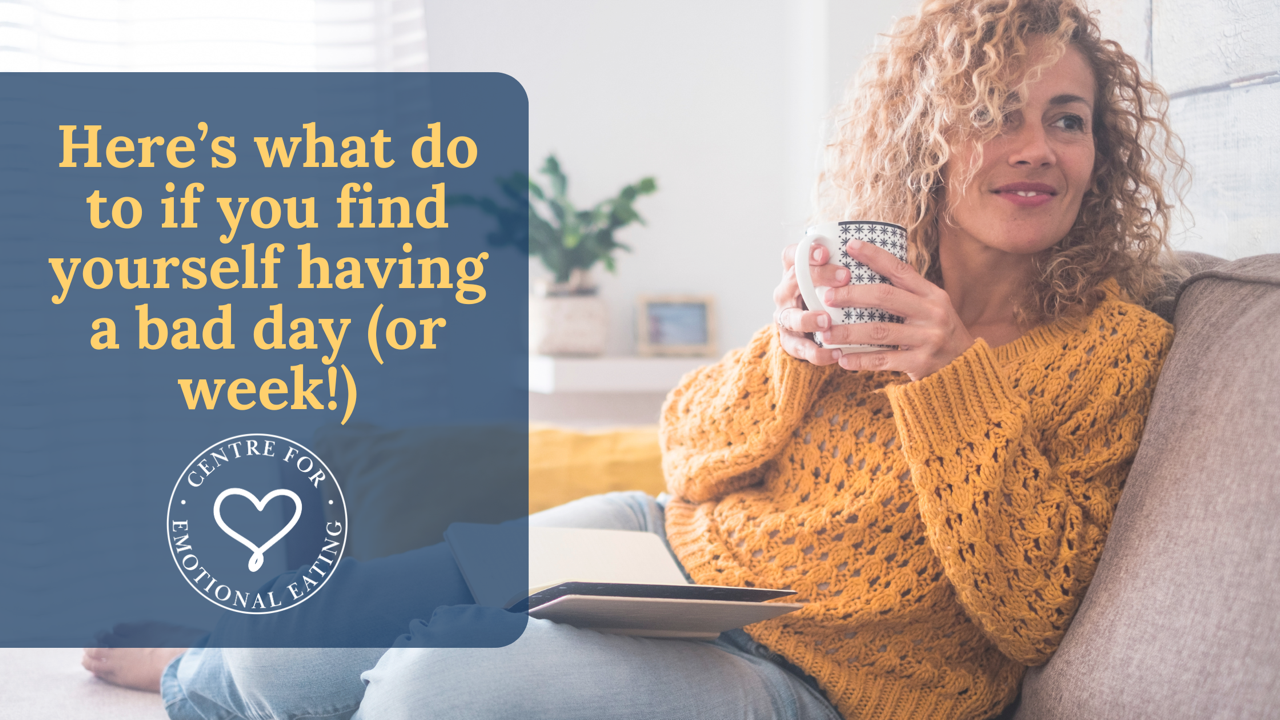BLOG
Find support not just for emotional eating, but all aspects of your well-being.
Client Insight: “I shifted how I thought about working out and it changed my relationship with my body.”

As an emotional eater you might feel constantly at war with your body. Trying to ignore cravings, stuff down feelings, and constantly critiquing your body. You might even feel betrayed by your body every time the scale goes up or your pants feel tighter.
A lot of this conflict comes from diet culture which encourages us to follow its rules instead of our own needs and wants. One of the most common rules, that you’ve probably engaged in, is the idea that movement is a means to an end to burn the greatest number of calories. If you’ve ever slogged through a workout or pushed past pain to hit a calorie target, chances are you have a not great relationship with movement.
But there are so many reasons to move your body that have nothing to do with your appearance! Read on to start reframing how you move your body and create more appreciation for all it does for you every day!
Forget Calories, Find Play
If you weren’t focused on how many calories you were burning, what movement would you...
Retrain Your Brain: Finding Happiness Outside of Food

There are many reasons people emotionally eat: to distract themselves, to feel numb, to have something to control. But one of the common reasons I hear from clients is that food brings them a sense of happiness that they feel doesn’t compare to any other experience currently in their life. This makes emotional eating incredibly difficult to stop relying on when you don’t have others ways of accessing this feel-good emotion. Does any of this sound familiar?
- A snack feels like an only acceptable break from grinding away at work or your to do list. Your brain makes the connection that not working = food.
- You only feel your body relax once the kids are in bed and you can eat alone in the evening. The connection your brain makes here is alone time = food time.
- You only allow yourself to have foods like cake or popcorn at events like parties or at the movie theatre. Here your brain connects special events (happy times) and specific foods.Our brains love to work on auto-pilot because it ...
Emotional Eating Toolkit: Creating a Comfort Box

We all have bad days (heck, even weeks!) where we feel drained, angry, or even upset most of the time. If this comes up for you, it is time to create a comfort box. This can be a great resource to build yourself back up when you’re feeling low.
Here’s how to do it:
The next time you’re feeling in a good place, put together a physical box or digital list that has things that bring you comfort when your mood is low. You can include:
- A playlist or movie that lifts you up (or helps you cry). This could be either to pump up your energy or create an emotional release. It can sometimes be difficult to allow ourselves to cry when we’ve been holding it together for so long; we often judge ourselves less when we’re crying over a fictional character.
- A candle you’ve always wanted to burn or a face mask you’re wanted to try. Often, we keep certain things for a “special occasion”, but why wait! Being able to indulge in little luxuries might just give you the small boost you’re looking for (in ...
Journaling Prompts for Fall

There is something about the Fall season that seems to bring about feelings of routine and reflection. Maybe it’s the back-to-school feeling we never quite lose, the colder weather having us slow down, or being aware that the calendar year is coming to a close. No matter what it is for you, know that you are not alone and that this time of year can have an impact on your mood.
To support you through these feelings and the sense of transition, we’ve got some journal prompts to help you reflect on what you might be experiencing and support you through it. Feel free to answer one or all of these in the way you enjoy journaling. That could look like full paragraphs, a few bullets, or even key words on a page with your doodling. There is no wrong way!
- What are some of your memories around Fall? How do they make you feel?
- What have you done in the past—hay rides, reading a scary Halloween book, baking with apples—that you’d like to try and do again this Fall?
- What is something you’re l ...
How Mindfulness Can Help with Emotional Eating

From easy-to-use apps to therapy practices, mindfulness seems to be an ever-present technique for managing our fast-paced world. But is it more than just a buzzword? Research shows that being more mindful can reduce stress and anxiety, alleviate depression, support your physical health, and more!
In today’s blog post, we’re breaking down just how you can implement this powerful tool into your life with just a few minutes at a time.
What is mindfulness?
Mindfulness is bringing awareness to the present moment. This looks like tapping into what your body is feeling, what thoughts or feelings are floating to the surface, and what you can see and feel (like the sunshine on your face). That might sound intimidating—especially if you’re someone who eats to avoid intense emotions—but acknowledging sensations, smells, and in the present moment means you can let go of anxiety of the future or grief over the past.
How can it help me with my emotional eating?
Emotional eaters often reach for ...
4 Self-Care Tips to Manage Seasonal Affective Disorder (SAD)

Seasonal Affective Disorder, or SAD, will look a little different for everyone. But if you notice you’re more irritable, your sleeping or eating patterns have changed, or you’re more anxious or depressed, you might be experiencing SAD.
We’re sharing four things that can help you find a mood boost in the darkest, coldest days of winter. We recommend creating a list you can easily reference, either in a notebook or on your phone’s notes app, of things that make you feel good. Either take inspiration from the ideas below or brainstorm your own! Personalizing an approach to support yourself through the next few months is a great way to show yourself some love.
Support
This can come in many forms, like a regular coffee date with a friend, scheduled therapy sessions, or speaking to your doctor about medication. Consider who in your life makes you feel supported and tap into that! If you feel intimidated going to the doctor, read this blog post for a little confidence boost.
Hygiene
When...
Reading as a Form of Self-Care (with book recommendations!)

Today’s blog is a guest post from Marisa over at Le Salon Literary Discussions. She runs a bookish business that offers reading recommendations, monthly online book discussions, and more!
Reading can be such a great way to relax. It can also be educational and help you learn new ideas and see yourself in new ways, which can be invigorating! No matter which you choose, both of these can support a sense of self-care.
I know it can be challenging to find time to read these days between work, life, TV, and scrolling. If you need a few tips on how to make some time to pick up your book or e-reader, I’ve got some advice that might help. My biggest tip is to make sure you are enjoying what you are reading—and that will look different for everyone. From romance to graphic novels, thrilling mysteries to classic novels. Here are some book recommendations to get you started.
Non-fiction books to support your body and mind:
- Furiously Happy: A Funny Book About Horrible Things by Jenny Lawson ...
A Peace of Mind Pep Talk

You’ve probably heard that the how you speak to yourself can lead to more or less self-esteem depending on what you say, what words you use, and the tone (negative or positive). It might be a conversation in our own mind, but there is power in your inner dialogue!
Recent research shows that speaking to yourself can also help sooth anxiety and reduce feelings of stress. Instead of hiding from these intense emotions, addressing them in a curious and kind way allows you to go slowly and see that they aren’t as overwhelming once you look at them. We’ve all been in the situation where putting our head in the sand has made a task seem that much more impossible.
While you may wish your anxiety would go away, there is no need to fight it. Begin with first observing what you are feeling—is it a flutter in your chest? An electric feeling up your legs?—and then ask your anxiety what is the concrete cause for these reactions. Maybe it is an upcoming review of your work at your job or you’re feel...
6 Journaling Prompts for After You’ve Eaten Emotionally

Take a deep breath. And another one.
Binges are full of emotions before, during, and after. Food has a way of giving us a sense of calm and numbness, but anyone who has eaten emotionally knows that the intense emotions that lead up to a binge and then the ones that follow after—guilt, shame—can leave you feeling so much worse than before any food was eaten.
Emotional eating is a common coping mechanism that many people use to manage everything from stress, to not getting enough sleep, to depression. While your mind may be telling you there is something shameful about emotional eating, the truth is that it is a sign that you are doing your best to manage everything life throws at you. And sometimes life can be overwhelming or scary or just plain crappy.
So, you’ve binged on all your favourite foods in an attempt to escape your negative feelings. As you slowly come out of the binge mentality and regret begins to blossom, take a moment to pull out your journal and try one or a few of t...
Your Emotional Eating Toolkit: Movement

This blog post is the one of a series where we’re giving advice on tools you can try and see if they are worth adding to your ‘toolkit’ when you’re faced with emotional eating. Some tools will work for you and others you won’t find as helpful—check out our previous posts here and give some of them a try!
When suffering from a low mental health day do you ever find yourself Googling how to improve your mood? Often, we come across the same line, something like “just work up a sweat and you’ll feel good in no time!” again and again. Sounds like advice from someone who doesn’t know what it feels like to be depressed or anxious, right? Chances are you’re already aware that movement makes you feel better, but you can’t force yourself to do it when you’re not in a great space mentally. And that is completely ok!
When we hear the term ‘working out’ we often think of intimidating gyms, uncomfortably tight clothing, following a difficult plan, and comparing ourselves to other people. It ca...


